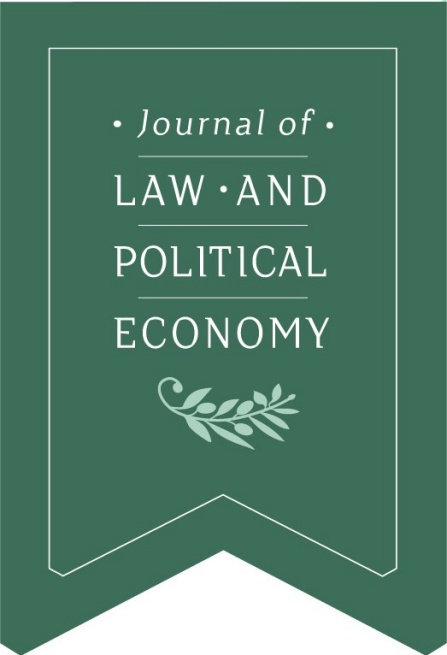
Producing Subjects: Rethinking Productivity, Subjectivity, and Value Part 1
In part one of this series, Anastasia Tataryn interviews Susan Brophy regarding the importance of rethinking productivity, subjectivity, and value.

In part one of this series, Anastasia Tataryn interviews Susan Brophy regarding the importance of rethinking productivity, subjectivity, and value.

The received narrative of free-market Hong Kong was indeed too good to be true, but it remains a necessary fantasy for advocates of neoliberal transformation.

Learned Hand once described the task of the Federal Trade Commission as “discover[ing] and mak[ing] explicit those unexpressed standards of fair dealing which the conscience of the community may progressively develop.” In a previous post, I argued that moving consumer protection law beyond consumer sovereignty requires recovering this way of thinking, common among Progressives and…

As other contributors to this symposium have noted, Mutant Neoliberalism effectively illustrates that neoliberalism cannot be reduced to neoclassical economics or the Washington Consensus, but instead must be understood as a constantly mutating cultural and political formation. What I want to address in this piece is the methodological lessons this volume offers those working in LPE.

There is a tension at the heart of the neoliberal state, between the ambition to install the market as a legally-mandated universal norm, and the ambition to nurture the most innovative, competitive and powerful firms and territories.

In an interview, Michel Foucault said that when “actually existing” socialism was put in scare quotes, as if it were not exactly “real,” the only thing the scare quotes revealed was the strength of an abstract ideal that theorists invariably used as a measuring stick to evaluate, and theoretically marginalize, whatever was actually happening on the ground. What if we were to apply such an ironic qualification to neoliberalism?

As I noted in my first post, it is possible that the COVID-19 pandemic will force a reckoning with the democratic deficit in the European Union and prompt a renewal of left-wing politics across the continent. However, the existing constitutional machinery of the five presidencies that make up the EU is both complex and considerably resistant to change, even (perhaps especially) in a crisis.

Ken Loach’s 2016 film I Am Daniel Blake (2016) depicts post-crash austerity in all of its bleak barbarity. The plot revolves around the film’s protagonist, a middle-aged carpenter, who attempts to navigate the British welfare system after a heart attack makes it hard for him to work. The message the system sends to our unlucky hero is that he is not worthy: of the state’s resources, of an employer’s goodwill, of anyone’s sympathy, of his own basic humanity. On Michel Feher’s assessment, we might add another shortcoming: he isn’t creditworthy, either.

Mutant Neoliberalism is an excellent collection of essays canvassing what editors William Callison and Zachary Manfredi rightly diagnose as the changing face of neoliberalism – really, the multiplicity of national, transnational and post-national neoliberalisms – evolving in the aftermath of the 2007-2008 financial crisis. Instead of a mortal wounding, the crisis generated the paradox, as several authors in the collection note, that neoliberalism’s failures led to more, not less, neoliberalism.

Will the rise of new political forces and the explosion of global crises sound neoliberalism’s death knell? Or will ostensible challenges to existing political and economic orders instead catalyze new mutations in neoliberalism’s dynamic development? Mutant Neoliberalism, a recent edited collection, brings together leading scholars of neoliberalism—political theorists, historians, philosophers, anthropologists and sociologists—to rethink transformations…

The consumer is at the center of the neoliberal’s moral universe. For both neoclassical welfarists and Hayekian moralists, the consumer is the Everyman. For, whatever else we do, we are all consumers. The “free market” has value because it forces the firms that control the process of production and distribution to compete for our business.…

As part of our ongoing effort to bring you the best LPE work on COVID-19, today we bring you this piece from John Whitlow, followed by a roundup of LPE COVID writing published elsewhere. The poet Langston Hughes once wrote, “I wish the rent was heaven sent.” With a record 10 million Americans filing for…

Economic models produce blindspots, compressing qualitative differences into quantitative measures. Yet, this vice is also the source of their power.

We live in a neoliberal age. For ideological reasons bound up in the epic struggle against totalitarianisms both left and right, a bold experiment in hyper-liberalism took root in the wake of the Cold War. Allowing the democratic achievements and aspirations of liberal and social democracy to atrophy, intellectuals and policymakers began an audacious celebration…

Over the past four decades, the right wing has painstakingly built an intellectual scheme to try to justify the weakening of regulatory public health protections on the basis of neoliberal economic theory. But a couple of decades ago, when the EPA began to figure out how—at least sometimes—to beat them at their own game, that…